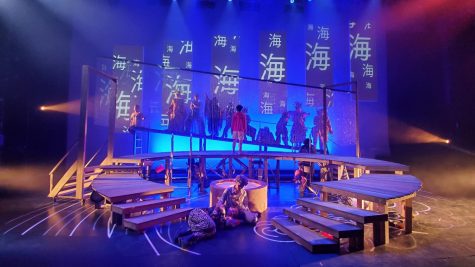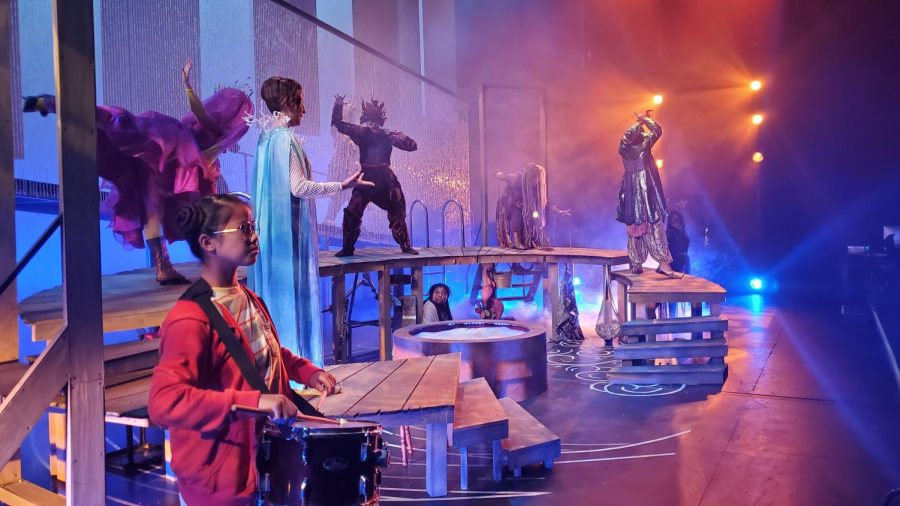“Miku and the Gods,” presented by San Diego State’s Arts Alive, took its audience on an emotional and thought-provoking journey. Through passionate acting and thoughtful set design, the performance led viewers through conversations about death, friendship and the simultaneous importance and impermanence of memories.
“Miku and the Gods,” written by Julia Izumi and directed by Peter James Cirino, follows the story of a young Japanese American girl from a polytheistic background who desires to be a god. The performance opened on Oct. 29 and completed its final showing on Nov. 5. It was held virtually and had a limited in-person audience to comply with COVID-19 protocols.
Despite the decision to be presented mostly virtually, which is atypical in pre-pandemic theater, nothing from the play seemed to be lost. The story and spirit of the actors were conveyed perfectly through the screen. Hope-Elizabeth Dagdagan, the SDSU student who portrayed 12-year-old Miku, had the ability to bring the audience back to their inquisitive and sometimes painful childhood years through her emotive acting.
Cirino explored this aspect of the performance during the “Miku and the Gods” Discovery Series Panel Conversation on Oct. 26.
“I get taken away by the story and by the fierceness [of] this young character that Julia wrote so well, Miku,” Cirino said. “And it makes me long for those times when I was little, to be that sponge and want to take on the world.”
Miku was struggling to deal with the death of her older brother and wanted to become a god so she could use her powers for good and ensure no more innocent people died. She and her new friend Ephriam, portrayed by Jaiden Sanmarti, sought out how to become a god and slowly learned of the sacrifices they must make.
At the same time, Miku’s grandmother, Grandma Seiko, was afflicted with dementia. She has lively and difficult conversations with her friend Shara, the minor god of war, portrayed by Booker Schrock. They dealt with the process of dying and the idea of memories fading being inevitable.
The elaborate storyline slowly revealed to the audience how all four characters are deeply connected through death. Through explosive and touching monologues from Grandma Seiko, Shara and Miku the audience is provoked to think about the complexity of memories and death.
The ability of the actors to portray characters far outside of their age range as well as their ability for their emotions to transcend beyond the Zoom screen was fascinating to watch. Justine Elise Banal, who portrayed Grandma Seiko, explained how she was able to relate to her role.
“My grandma is my rock. A lot of who I am today, as corny as it sounds, is because of her. So, it was really interesting to play that opposite role and be that person for Miku in the play,” Banal said.
The audience not only received both the calm and intense acting moments well, but the music, lighting and set design further helped the performance come to life.
Although the set was static throughout the performance, it was well utilized through use of multiple levels for the actors to walk on and a wall of crystal-like beads which added dimension. The bold, colorful lighting of Act II synced with the mood and made each scene vibrant and visually pleasing.

The costumes also added to the visual beauty of the play. The gods’ costumes were all brilliantly unique and eye-catching. They created a nice contrast from the regular clothes of the human characters. The captivating end scene where the gods finally spoke about their personal deaths was made all the more interesting because of their costumes.
The utilization of different camera angles for the Zoom audience was engaging and made it feel almost as if watching a film. From the music to where the character stood on stage, everything in the play was well connected and symbolic.
Along with the central themes of the play, Izumi wanted to showcase Japanese American culture. She did so through Grandma Seiko’s onigiri, the use of Japanese honorifics, the practice of polytheistic culture and more. In the “Miku and the Gods” panel, Izumi described the importance of having polytheistic representation and how it was a reflection of her own experiences.
“Miku is Japanese American because I am. Her story is not my story, but a lot of me is in her,” Izumi said.
To learn more about the upcoming performances from SDSU’s Arts Alive visit the School of Theater, Television and Film event page or visit the Arts Alive SDSU website.










